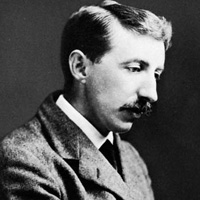Our Graves in Gallipoli by E. M. Forster: Critical Commentary
The intention of Forster's essay is clearly persuasive, just as its form is clearly dramatic. According to the analytic procedures, the form of any given essay dictates the critical approach to be used in understanding it. This means that we should examine Forster's essay in terms of its dramatic elements. The basic elements of drama are character, plot, and setting.

E. M. Forster (1879-1970)
Our analysis, then, will focus on the nature of the characters, their situation, and the movement-the plot-of their dialogue.
In the dramatic essay it is often the case that one or more of the characters embodies the opinions of the essayist. Thus, an analysis of the two Graves should help us to understand Forster's persuasive method. We might first ask ourselves whether we discern any significant differences between the two Graves, whether we can distinguish them as "characters". They are certainly not distinguished by having special names or physical qualities; in fact, all such individualizing characteristics are deliberately suppressed. Nevertheless, the two are different. First Grave does most of the talking. Second Grave confines himself to brief remarks and questions. First Grave is the most indignant, and his indignation shows in the heavy sarcasm of his dialogue. Second Grave is calmer more resigned. First grave is unusually well-informed and up-to-date on English politics-particularly for a grave. Second Grave, at least on the basis of his questions, seems to be out of touch. Now that we have made these distinctions, we can see part of Forster's persuasive strategy. Second Grave is, in a sense, the straight man, who makes it possible for First Grave to voice Forster's opinions.
We have put off remarking on an obvious point of distinction between the two characters-that one is English, the other a Turk-for this difference is related to plot. And plot, like character; is also related to Forster's persuasive technique. Throughout most of the dialogue First Grave is clearly in control of things. But when Second Grave reveals his nationality, First Grave is taken completely by surprise-and we are, too. This is the climax in the plot of the dialogue, for it produces a sudden reversal in which First Grave learns that Second Grave is not a "friend" but an "enemy". This surprise is related to the type of dramatic revelation that we often encounter in the concluding scenes of a play. In this dialogue it serves to work a turn from the political to the personal, and from the specific discussion of one possible war to a more general appeal for understanding and brotherhood among all men. In this respect it bears an interesting relation to White's meditations on war and his attempts to oppose its destructiveness by seeking to understand and sustain life among all natural creatures.
The two graves in Forster's essay never comment on their own natural surroundings, but the particular setting in which they are located contributes to the significance of their dialogue. The scene, we must remember, is overlooking the Dardanelles, a strait often referred to as the dividing line between East and West, Asia and Europe. These speakers represent the opposite sides of that great cultural chasm, and their conversation recalls the history of wars fought in that part of the world. In Forster's dialogue First Grave seems to know Homer, for he adopts the Homeric technique to name the contemporary war lords of his country England. He calls Lloyd George "prudent in counsels" and Churchill "lion-hearted." But Churchill is not only called "lion-hearted" and "Fortunate"; he is also referred to as "ever in office" - a phrase that moves from heroic to satiric, as in fact do all these epithets when applied not to the fighting heroes of an epic poem but to sedentary politicians who send other men off to their death in combat.
There is, finally, a third voice in this dialogue: that of the scene-setter, who has the first and the last word. This is Forster's chance to have his say, but he does not comment specifically on the meaning of the dialogue-he lets the dialogue speak for itself. He does, however, describe the setting sun-that symbol of the waning British Empire-and contrasts it with the stars, which are always present but only "become apparent" when the sun's glare gives way to shadows. In particular the closing -stage direction," with its symbolism of sun and stars, brings a poetic and meditative dimension to the essay. The sun moves, the stars abide. In the light of the sun, "warlike preparations" are made; the stars remain, becoming visible only when the "objects enter into their own shadows." In the light of the stars, "all graves are one." In this brief essay we thus have dramatic form used to make a persuasive argument against a specific war and growing out of the argument is a more enduring meditation on the brevity of all life and the futility of life based on hostility rather than on brotherhood.
(This commentary has been adapted from “Elements of Literature” edited by Robert Scholes, Nancy R. Comley, Carl H. Klaus, and Michael Silverman)
